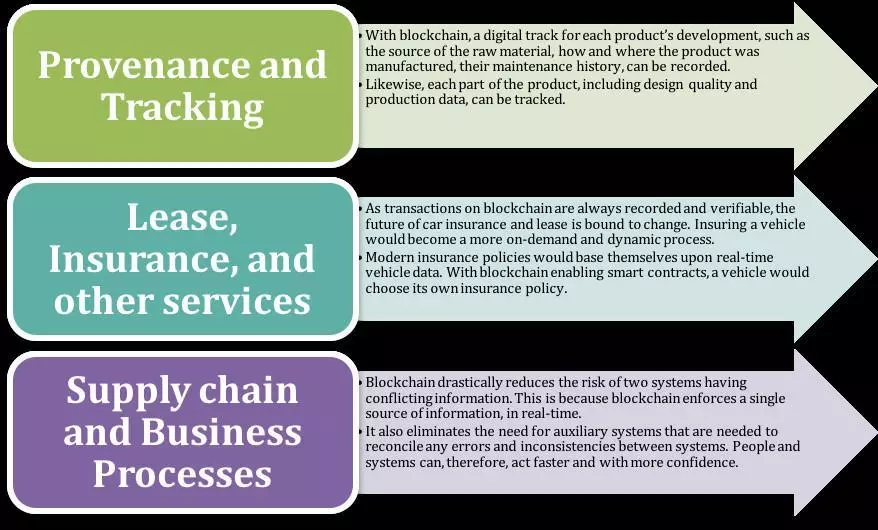Comments (4)
Martin Barnes
Interesting
Gary Stevens
It seems like all industries are exploring the blockchain technology
Marco Silva
Insurers will be the ones to mostly rely on blockchain
Kumar Mohit
good article

The blockchain technology in the automotive industry should be seen as one of the essential building blocks of a new kind of infrastructure that supports vehicles of the future.
Let’s start with a simple fact – By 2025, the participants in the automotive sector are expected to spend approximately 0.6% of their total IT spend on blockchain technology, alone. Ranging from supply chain management to leasing, a variety of automotive industry verticals have been identified, where blockchain has the potential to be a disruptor. The industry is, therefore, beginning to build momentum to experience blockchain penetration outside of an R&D or a lab setting.
Since early 2017, automakers, from all around the globe, have shown a desire to explore how blockchain technologies can be used. The blockchain technology in the automotive industry is not just about the transformation of the OEM’s working mode but is also about fundamental changes to the current business models. Here are some of the most obvious ways of using the blockchain technology in the automotive industry.
A key differentiator for most automotive companies is the customer’s trust in the quality of their brand and products. With blockchain, a digital track for each product’s development, such as the source of the raw material, how and where the product was manufactured, their maintenance history, can be recorded. Likewise, each part of the product, including design quality and production data, can be tracked. Using blockchain, the authenticity, provenance, purchase, trading, and license use can all be protected. Multiple supply chain partners can use this technology to corroborate the authenticity of their products.
Since the idea is to see vehicles as ‘smart’ vehicles, all services and their underlying business models will need to be revolutionised as a whole with blockchain. As transactions on blockchain are always recorded and verifiable, the future of car insurance and lease is bound to change. Insuring a vehicle would become a more on-demand and dynamic process. Modern insurance policies would base themselves upon real-time vehicle data. With blockchain enabling smart contracts, a vehicle would choose its own insurance policy. Similarly, a leased vehicle would manage all necessary contractual transactions using smart contracts drawn on it. This means that a vehicle would enforce monthly leasing payments and decline the service in case a payment fails. As all the transactions are maintained on a vehicle’s own blockchain, they are all instantly available whenever required.
The automotive sector has many ERP and operational systems that manage the manufacturing process and generate vehicle data. These, in turn, communicate with hundreds of other systems downstream, which are dependent on several data feeds to perform their functions. All of this results in bloating the size of the IT team that reconciles between the various systems and introducing complexity in the IT landscape. Blockchain simplifies the situation. It drastically reduces the risk of two or more systems using conflicting information. This is because blockchain enforces a single source of information, in real-time. This also eliminates the need for auxiliary systems that are needed to reconcile any errors or inconsistencies between systems. People and systems can, therefore, act faster and with more confidence.
Blockchain in the automotive industry can significantly streamline processes. It alleviates the need for regulatory and compliance approvals. CIOs, CFOs, and CTOs should be able to make a strong business case for implementing blockchain in the automotive arena. The technology prepares vehicles for a future environment where they would interact with it in new ways.
Interesting
It seems like all industries are exploring the blockchain technology
Insurers will be the ones to mostly rely on blockchain
good article
Naveen is the Founder and CEO of Allerin, a software solutions provider that delivers innovative and agile solutions that enable to automate, inspire and impress. He is a seasoned professional with more than 20 years of experience, with extensive experience in customizing open source products for cost optimizations of large scale IT deployment. He is currently working on Internet of Things solutions with Big Data Analytics. Naveen completed his programming qualifications in various Indian institutes.
Leave your comments
Post comment as a guest